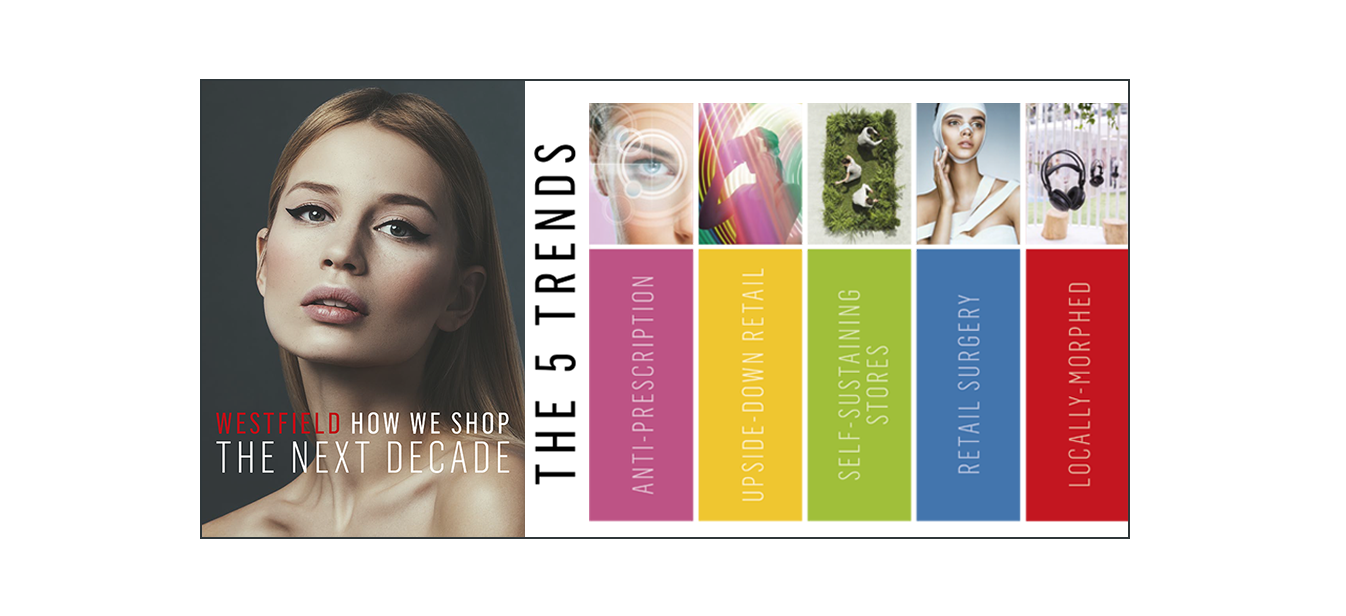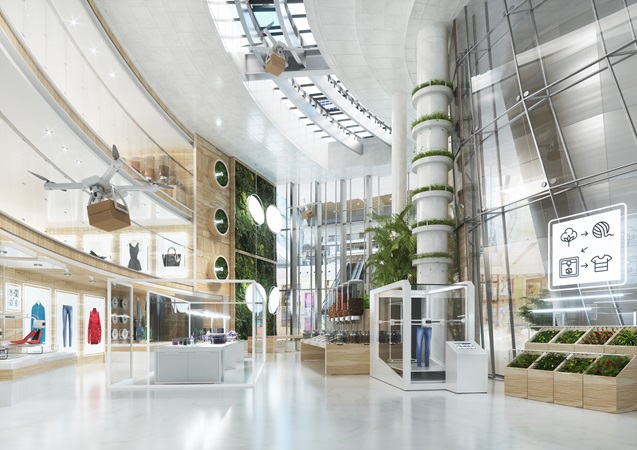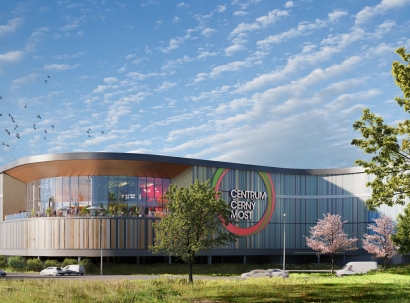A new decade of experience retail dawns across Europe
On January 14, we unveiled ‘Westfield How We Shop: The Next Decade’, our biggest retail trends report to date, which predicts 2025 will be the experience tipping point in retail, when more than half of retail space in stores will be dedicated to providing experiences.
The report reveals the needs and wants of 15,700 consumers across ten countries in Europe including France, the UK, Spain, Germany, Austria, Sweden, Poland, the Czech Republic, Italy and the Netherlands and predicts the five major trends to shape the industry over the next ten years including:
• UPSIDE-DOWN RETAIL – the entire retail model and peoples’ shopping habits will turn on its head by 2025, with 59% of consumers expecting more than half of retail space will be devoted to experience rather than product by this time. 75% of consumers have the view that this will happen by 2027. 81% of customers globally are willing to pay more for experience1 with the most requested in-store activities needing to be creative, health and games orientated.
• ANTI-PRESCRIPTION – 56% of European consumers are frustrated by inaccurate online retail recommendations proving retailers should stay close to their consumers through data. Nearly 60% want to browse full ranges, not curated edits. Smart digital and bricks brands that use their online space to showcase the full range and their physical stores to surprise and delight could become tomorrow’s star performers. Consumers are requesting more of their loved online brands to enter bricks & mortar, with the likes of streaming services Netflix, Spotify and Tinder all proving popular.
• SELF-SUSTAINING STORES – consumer conscience will rapidly accelerate a demand for more sustainable solutions with 71% of people demanding products are made in-store. 76% of Europeans want retailers to do more to address environmental concerns.
• RETAIL SURGERY – retailers will take personalisation to the next level using science to diagnose precise needs, which could be worth more than €4 Tn per year in Europe2. More than a third of customers are willing to provide their DNA in return for accurate recommendations.
• LOCALLY-MORPHED – retail spaces of tomorrow will become community hubs with 70% of consumers desiring them to reflect the people who live in the area. 51% would prefer local brands to well-known ones.
The launch of the ‘Westfield How We Shop: The Next Decade’ report follows the roll-out of the only global shopping, leisure and dining destination brand, Westfield, across Continental Europe. Ten flagship destinations and two future developments were rebranded in France, Poland, the Czech Republic, Sweden, Germany and the Netherlands in 2019 with more locations to follow in 2020.
“The ‘Westfield How We Shop: The Next Decade’ report is one of the largest European studies of consumers’ retail habits and is an industry first. Understanding customers’ needs today and tomorrow is part of our commitment to driving the industry forward and ensuring we provided the ultimate destinations four visitors to enjoy and our retailers and brands to thrive in.”
“The important role of the physical store is changing and retailers need to enter another decade of reinvention to remain relevant. Retailers that lead on sustainability, devote more space to experience, provide free-range browsing online and in store, deliver precise product recommendations based on science and think local will reap the benefits.”
TRENDS IN DETAIL
Upside Down Retail
The experience economy has changed the face of retail where today’s shopper looks for 40% of retail space to be given over to experiences, but this is set to accelerate. The Westfield How We Shop report has identified 2025 as the experience tipping point. By this date, 59% of consumers expect retail spaces to handover more than half of their square meterage to seeing and doing, with three quarters of all shoppers (75%) predicting it will happen, at the very latest, by 2027.
42% of all European consumers and nearly half of Spanish, French and Czech shoppers want more creative experiences in store – from studios where you can create your own podcasts to video games. With rise of co-working across Europe, nearly 30% of city dwellers are seeking workspaces and educational opportunities within stores which rises to nearly 50% of people in Warsaw.
Anti-Prescription
Research shows that despite the rise of automation in their lives, shoppers want to feel in control of their purchasing decisions. More than 143 million shoppers across key European cities are frustrated by inaccurate product recommendations whilst shopping online. 56% of European shoppers overall are not happy with their online recommendations with the most frustrated countries Poland at 70%, Spain at 63% and Austria at 62%, demonstrating the critical need to truly understand your customer.
This is triggering a movement of anti-personalisation, with four out of five (80%) of European shoppers stating they enjoy the overall vibe of shopping in physical retail environments.
More online brands are looking to expand into physical retail for the first time to deepen their relationships with their consumers. The research unveiled the online brands that consumers would like to see in a physical store setting in the next ten years with 47% of shoppers wanting to see a Netflix store and 33% wanting Spotify.
Self-Sustaining Stores
As consumers become even more conscious of their ecological impact on the planet, they are looking to brands to help them create a more sustainable future. The research shows that 290 Mn shoppers across Europe demand that the stores of the future become truly self-sufficient. Moving to a self-sustaining store model requires significant infrastructural change for big businesses. Smaller, nimble start-ups are likely to lead the charge and put pressure on larger businesses to change.
An impressive 71% of shoppers want brands to make products in-store whilst they wait or are created in-store beforehand to minimise waste, marking a trend for factory stores. 60% of European shoppers also want to ban single-use plastics with Austria, Spain, Germany, the UK and Poland all higher than the European average.
The store of the future will extend this self-sufficient approach and will include allotments on the roof to grow ingredients, a 4D-printing factory and studio allowing design teams to create product on demand. In addition, shoppers will be assured of zero-waste packaging solutions that will happen in-store and will even be able to pay for goods through points programmes where customers are rewarded for their positive eco-friendly practices.
Rental retail is also a growing trend amongst European consumers, all leading to the store of the future being more sustainable. Spanish, Polish, Swedish and Italian consumers are all higher than the average 45% of European consumers wanting to rent some products rather than buying them. Cars, scooters, home amenities and fashion and beauty are all popular potential rental items.
Retail Surgery
As we enter the new decade, research shows retailers will be able to, and be expected to, diagnose precisely what a shopper needs based on fact, rather than presumption, as just over half (51%) of shoppers look to stores to offer personal consultations in order to identify the perfect products for them. The Retail Surgery market of tomorrow could be worth up to €4 Tn Euros per year across Europe.
Retailers will start to act like doctors, prescribing specific, personalised and accurate solutions that will enhance shoppers’ day-to-day lives. The trend comes to life through the research as a third (31%) of shoppers reveal they are happy to hand over their DNA in order to receive products better suited to them. The DNA testing market alone could be worth in excess of €18 billion across Europe, presenting an exciting opportunity for retailers over the next decade.
Locally-Morphed
A trend for town hall malls is set to change retail destinations as we know them, as they morph into their surrounding environments, shaped by the individual communities they serve. Almost half of today’s shoppers have a strong desire to be more connected with their local community, with seven out of ten shoppers revealing they want the retail environments of the future to reflect the individuals and communities in an area. This is particularly the case in Spain and Italy, where three quarters of shoppers want their shopping spaces to reflect the desires of local people.
Over half (51%) of shoppers say they would prefer to see home-grown brands over well-known ones in the retail environments of the future. This rises to 62% for Austrian and French consumers. 31% state they would like more ‘locally-flavoured’ community-feel experiences, such as local farmers selling their organic produce. There are also signs of rising nostalgia as consumers desire experiences such as book clubs, social clubs and community fairs, harking back to former times.
Read the full report here.
The report reveals the needs and wants of 15,700 consumers across ten countries in Europe including France, the UK, Spain, Germany, Austria, Sweden, Poland, the Czech Republic, Italy and the Netherlands and predicts the five major trends to shape the industry over the next ten years including:
• UPSIDE-DOWN RETAIL – the entire retail model and peoples’ shopping habits will turn on its head by 2025, with 59% of consumers expecting more than half of retail space will be devoted to experience rather than product by this time. 75% of consumers have the view that this will happen by 2027. 81% of customers globally are willing to pay more for experience1 with the most requested in-store activities needing to be creative, health and games orientated.
• ANTI-PRESCRIPTION – 56% of European consumers are frustrated by inaccurate online retail recommendations proving retailers should stay close to their consumers through data. Nearly 60% want to browse full ranges, not curated edits. Smart digital and bricks brands that use their online space to showcase the full range and their physical stores to surprise and delight could become tomorrow’s star performers. Consumers are requesting more of their loved online brands to enter bricks & mortar, with the likes of streaming services Netflix, Spotify and Tinder all proving popular.
• SELF-SUSTAINING STORES – consumer conscience will rapidly accelerate a demand for more sustainable solutions with 71% of people demanding products are made in-store. 76% of Europeans want retailers to do more to address environmental concerns.
• RETAIL SURGERY – retailers will take personalisation to the next level using science to diagnose precise needs, which could be worth more than €4 Tn per year in Europe2. More than a third of customers are willing to provide their DNA in return for accurate recommendations.
• LOCALLY-MORPHED – retail spaces of tomorrow will become community hubs with 70% of consumers desiring them to reflect the people who live in the area. 51% would prefer local brands to well-known ones.
The launch of the ‘Westfield How We Shop: The Next Decade’ report follows the roll-out of the only global shopping, leisure and dining destination brand, Westfield, across Continental Europe. Ten flagship destinations and two future developments were rebranded in France, Poland, the Czech Republic, Sweden, Germany and the Netherlands in 2019 with more locations to follow in 2020.
“The ‘Westfield How We Shop: The Next Decade’ report is one of the largest European studies of consumers’ retail habits and is an industry first. Understanding customers’ needs today and tomorrow is part of our commitment to driving the industry forward and ensuring we provided the ultimate destinations four visitors to enjoy and our retailers and brands to thrive in.”
Christophe Cuvillier, Group Chief Executive Officer, Unibail-Rodamco-Westfield
“The important role of the physical store is changing and retailers need to enter another decade of reinvention to remain relevant. Retailers that lead on sustainability, devote more space to experience, provide free-range browsing online and in store, deliver precise product recommendations based on science and think local will reap the benefits.”
Myf Ryan, Chief Marketing Officer Europe and Group Director of Brand and Strategic Marketing, Unibail-Rodamco-Westfield
TRENDS IN DETAIL
Upside Down Retail
The experience economy has changed the face of retail where today’s shopper looks for 40% of retail space to be given over to experiences, but this is set to accelerate. The Westfield How We Shop report has identified 2025 as the experience tipping point. By this date, 59% of consumers expect retail spaces to handover more than half of their square meterage to seeing and doing, with three quarters of all shoppers (75%) predicting it will happen, at the very latest, by 2027.
42% of all European consumers and nearly half of Spanish, French and Czech shoppers want more creative experiences in store – from studios where you can create your own podcasts to video games. With rise of co-working across Europe, nearly 30% of city dwellers are seeking workspaces and educational opportunities within stores which rises to nearly 50% of people in Warsaw.
Anti-Prescription
Research shows that despite the rise of automation in their lives, shoppers want to feel in control of their purchasing decisions. More than 143 million shoppers across key European cities are frustrated by inaccurate product recommendations whilst shopping online. 56% of European shoppers overall are not happy with their online recommendations with the most frustrated countries Poland at 70%, Spain at 63% and Austria at 62%, demonstrating the critical need to truly understand your customer.
This is triggering a movement of anti-personalisation, with four out of five (80%) of European shoppers stating they enjoy the overall vibe of shopping in physical retail environments.
More online brands are looking to expand into physical retail for the first time to deepen their relationships with their consumers. The research unveiled the online brands that consumers would like to see in a physical store setting in the next ten years with 47% of shoppers wanting to see a Netflix store and 33% wanting Spotify.
Self-Sustaining Stores
As consumers become even more conscious of their ecological impact on the planet, they are looking to brands to help them create a more sustainable future. The research shows that 290 Mn shoppers across Europe demand that the stores of the future become truly self-sufficient. Moving to a self-sustaining store model requires significant infrastructural change for big businesses. Smaller, nimble start-ups are likely to lead the charge and put pressure on larger businesses to change.
An impressive 71% of shoppers want brands to make products in-store whilst they wait or are created in-store beforehand to minimise waste, marking a trend for factory stores. 60% of European shoppers also want to ban single-use plastics with Austria, Spain, Germany, the UK and Poland all higher than the European average.
The store of the future will extend this self-sufficient approach and will include allotments on the roof to grow ingredients, a 4D-printing factory and studio allowing design teams to create product on demand. In addition, shoppers will be assured of zero-waste packaging solutions that will happen in-store and will even be able to pay for goods through points programmes where customers are rewarded for their positive eco-friendly practices.
Rental retail is also a growing trend amongst European consumers, all leading to the store of the future being more sustainable. Spanish, Polish, Swedish and Italian consumers are all higher than the average 45% of European consumers wanting to rent some products rather than buying them. Cars, scooters, home amenities and fashion and beauty are all popular potential rental items.
Retail Surgery
As we enter the new decade, research shows retailers will be able to, and be expected to, diagnose precisely what a shopper needs based on fact, rather than presumption, as just over half (51%) of shoppers look to stores to offer personal consultations in order to identify the perfect products for them. The Retail Surgery market of tomorrow could be worth up to €4 Tn Euros per year across Europe.
Retailers will start to act like doctors, prescribing specific, personalised and accurate solutions that will enhance shoppers’ day-to-day lives. The trend comes to life through the research as a third (31%) of shoppers reveal they are happy to hand over their DNA in order to receive products better suited to them. The DNA testing market alone could be worth in excess of €18 billion across Europe, presenting an exciting opportunity for retailers over the next decade.
Locally-Morphed
A trend for town hall malls is set to change retail destinations as we know them, as they morph into their surrounding environments, shaped by the individual communities they serve. Almost half of today’s shoppers have a strong desire to be more connected with their local community, with seven out of ten shoppers revealing they want the retail environments of the future to reflect the individuals and communities in an area. This is particularly the case in Spain and Italy, where three quarters of shoppers want their shopping spaces to reflect the desires of local people.
Over half (51%) of shoppers say they would prefer to see home-grown brands over well-known ones in the retail environments of the future. This rises to 62% for Austrian and French consumers. 31% state they would like more ‘locally-flavoured’ community-feel experiences, such as local farmers selling their organic produce. There are also signs of rising nostalgia as consumers desire experiences such as book clubs, social clubs and community fairs, harking back to former times.
Read the full report here.


The store of the future: a Self-Sustaining Store
Full screen button



